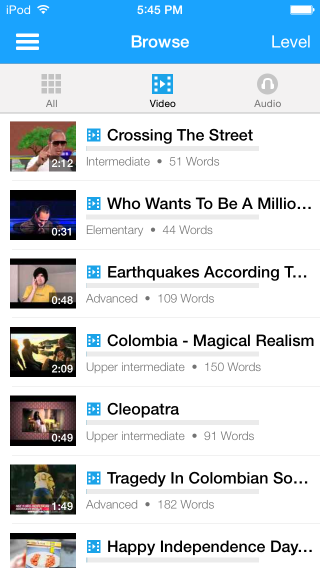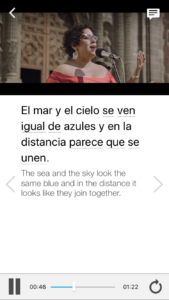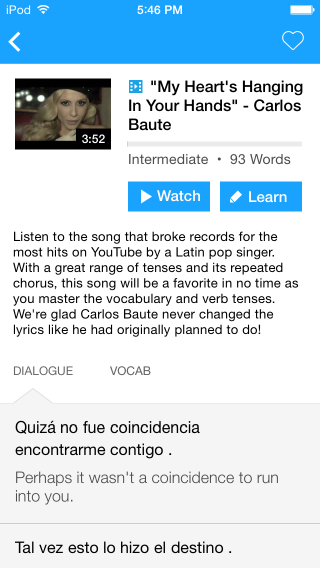The first thing you learn in a foreign language is basic, general conversation.
If you want to take your Spanish out of the classroom and into the real world, the second thing you learn is curse words.
And the third thing you learn is how to sound cool. You’re lucky that Spanish is naturally a really cool language.
There are hundreds of cool things to say! But we know that in order for slang to keep its “coolness,” it must constantly change to keep up with the times. You’d surely get a blank stare if you said “groovy” or “groaty-to-the-max” around your friends.
It also varies according to region. Think of how confused you might get listening to British or Australian English. Cookies are biscuits, chips are crisps and girls are sheilas?!
Since Spanish is spoken in more countries than any other in the world, the gap may be the widest of any language. It’s the primary language on almost an entire continent!
Being spoken by nearly 400 million people in more than 30 different countries, the language in its modern and practical use leaves a lot of room for variation.
What may sound cool in one area may mean something else in another region, or it may not make any sense at all.
Here are 20 cool things you can say in Spanish, with the regional specifications of the ones that aren’t so international.
Other sites use scripted content. FluentU uses a natural approach that helps you ease into the Spanish language and culture over time. You’ll learn Spanish as it’s actually spoken by real people.
FluentU has a wide variety of videos—topics like soccer, TV shows, business, movies and even magical realism, as you can see here:

FluentU brings native videos within reach with interactive transcripts. You can tap on any word to look it up instantly. Every definition has examples that have been written to help you understand how the word is used. If you see an interesting word you don’t know, you can add it to a vocab list.

Review a complete interactive transcript under the Dialogue tab, and find words and phrases listed under Vocab.

Learn all the vocabulary in any video with FluentU’s robust learning engine. Swipe left or right to see more examples of the word you’re on.

The best part is that FluentU keeps track of the vocabulary that you’re learning, and it recommends you examples and videos based on the words you’ve already learned. Every learner has a truly personalized experience, even if they’re learning the same video.
Start using FluentU on the website with your computer or tablet or, better yet, download the FluentU app from the iTunes or Google Play store for iOS and Android devices.
Mala onda can also be used to say the opposite. This is another one that is mostly centered around Mexico.
It could be used very similarly to say “take it easy” or “chill out,” and is used most frequently in Argentina.
In Argentina, dale is a word used similarly to this.
Note: This word is not also a homonym in Spanish, so if you want to say “cool” to describe the weather, or anything else relating to a temperature, fresco is the word to use.
Estoy enganchada a esta serie. (I am hooked on this series.)
It means to “take a poo.” You can also use hacer el número dos, which is the same as we say “take a #2.” The more formal (but less cool) way to say it is defecar or ir de cuerpo.
We have some weird ones in English, too. This metaphor can be compared to “I have an itch for a coffee,” which would probably sound equally strange to a native Spanish speaker.
Used in quite a few Spanish-speaking regions, it’s often attributed to a person. Ella tiene mala leche. (She’s mean.) or Ella lo hizo con mala leche. (She did it with bad intentions.)
Perhaps there are lots of dishes in the sink and someone suggests to use the dishwasher—you might say, “¡Genio!”
There are many words that are absent from the English language, but would be incredibly useful. One of these is pecueca, which is a single word that means “the smell from stinky feet.”
Ponte zapatos, hombre. La pecueca es muy fuerte. (Put on shoes, man. The stinky-feet smell is very strong.)
This one is commonly used in Colombia.
¿Quieres merendar? (Do you want to go out for a snack?)
This is also a very common thing to do in Spain.
Well, congratulations.
You’re substantially cooler than when I first met you.
And the more Spanish you learn, the cooler you’ll get.
Happy studies and buena suerte.
If you want to take your Spanish out of the classroom and into the real world, the second thing you learn is curse words.
And the third thing you learn is how to sound cool. You’re lucky that Spanish is naturally a really cool language.
There are hundreds of cool things to say! But we know that in order for slang to keep its “coolness,” it must constantly change to keep up with the times. You’d surely get a blank stare if you said “groovy” or “groaty-to-the-max” around your friends.
It also varies according to region. Think of how confused you might get listening to British or Australian English. Cookies are biscuits, chips are crisps and girls are sheilas?!
Since Spanish is spoken in more countries than any other in the world, the gap may be the widest of any language. It’s the primary language on almost an entire continent!
Being spoken by nearly 400 million people in more than 30 different countries, the language in its modern and practical use leaves a lot of room for variation.
What may sound cool in one area may mean something else in another region, or it may not make any sense at all.
Here are 20 cool things you can say in Spanish, with the regional specifications of the ones that aren’t so international.
20 Cool Phrases in Spanish
The best way to pick up even more authentic Spanish phrases is through immersion, and no one does immersion better than FluentU! FluentU takes real-world videos, like music videos, commercials, news and inspiring talks, and turns them into Spanish learning experiences.Other sites use scripted content. FluentU uses a natural approach that helps you ease into the Spanish language and culture over time. You’ll learn Spanish as it’s actually spoken by real people.
FluentU has a wide variety of videos—topics like soccer, TV shows, business, movies and even magical realism, as you can see here:

FluentU brings native videos within reach with interactive transcripts. You can tap on any word to look it up instantly. Every definition has examples that have been written to help you understand how the word is used. If you see an interesting word you don’t know, you can add it to a vocab list.

Review a complete interactive transcript under the Dialogue tab, and find words and phrases listed under Vocab.

Learn all the vocabulary in any video with FluentU’s robust learning engine. Swipe left or right to see more examples of the word you’re on.

The best part is that FluentU keeps track of the vocabulary that you’re learning, and it recommends you examples and videos based on the words you’ve already learned. Every learner has a truly personalized experience, even if they’re learning the same video.
Start using FluentU on the website with your computer or tablet or, better yet, download the FluentU app from the iTunes or Google Play store for iOS and Android devices.
1. ¿Qué onda?
While this one translates directly to “What wave?” it can be used in place of “What’s up?” This one is mostly used in Mexico and a few nearby Latin American countries.2. Venga, hombre
This one translates to “Come on, man.” You might say it if someone is being slow or “yanking your chain.” Since it’s a pretty basic phrase, it can be used in most Spanish-speaking countries, although it’s mostly heard in Spain.3. Buena onda
Translating directly to “good wave,” this one is most similar to “good vibes.” You can use it to say that something or someone is good.Mala onda can also be used to say the opposite. This is another one that is mostly centered around Mexico.
4. Bajar un cambio
Awkwardly translating to “lower a change,” this one can be used to tell someone who seems uptight or tense to calm down or slow down a little.It could be used very similarly to say “take it easy” or “chill out,” and is used most frequently in Argentina.
5. Órale
Odds are you’ve probably heard this word before. It’s one of the coolest slang words, and is also very fun to say. This word can be used in a few different ways, but most often it’s used in the way of a “Right on!” “Come on!” or “Yeah!” to agree to something in English. It’s usually said with great enthusiasm, and mostly by Mexicans.In Argentina, dale is a word used similarly to this.
6. Chido
There are many different ways to say “cool” in the Spanish language. Chido is one of the most common ways to say it in Mexico. In Spain, guay is a common way to say it, in Argentina, there’s copado and in Ecuador chévere can be used.Note: This word is not also a homonym in Spanish, so if you want to say “cool” to describe the weather, or anything else relating to a temperature, fresco is the word to use.
7. No manches
Another primarily Mexican word, this one translates to “No way!” You may use it if you think someone is playing around or if they say something surprising.8. ¡Qué barbaridad!
Since this one is a pretty direct translation, it’s used in many regions. It means “What barbarity!” and is used similarly to “That’s ridiculous!” “That’s crazy” or “That’s nuts!”9. Tranquilo/a
This words means “calm.” It can be used to tell someone “Calm down,” or “Don’t worry.” It can also be used to say “chillin’.” The way it’s used colloquially can vary from country to country, but they’re all similar variations.10. Estoy enganchado/a
This means “I am hooked.” It can be used in the way of saying that one is “hooked on” or “addicted to” a TV show, snack or something similar.Estoy enganchada a esta serie. (I am hooked on this series.)
11. Por si las moscas
Translating directly to “just in case the flies,” this old expression is used similarly to how we say “just in case.” If you’re doing something that seems superfluous or unnecessary, this expression may be used as an explanation.12. Plantar un pino
This is a cool metaphor that translates to “planting a pine.” Can you guess what it means?It means to “take a poo.” You can also use hacer el número dos, which is the same as we say “take a #2.” The more formal (but less cool) way to say it is defecar or ir de cuerpo.
13. Tener mono
This is another fun metaphor that can be used to say you feel like doing something, especially when you’ve decided to quit or you suddenly realize you haven’t done it for a long time. Yo tengo mono de café. It sounds much more strange in English: “I have the monkey of coffee.” This one is heard mostly in Spain.We have some weird ones in English, too. This metaphor can be compared to “I have an itch for a coffee,” which would probably sound equally strange to a native Spanish speaker.
14. Mala leche
Depending on where you’re at, the meaning of this one can change slightly. Translating directly to “bad milk,” it usually means something along the lines of being mean, “pissed off” or having ill-intentions.Used in quite a few Spanish-speaking regions, it’s often attributed to a person. Ella tiene mala leche. (She’s mean.) or Ella lo hizo con mala leche. (She did it with bad intentions.)
15. ¡Genio!
This translates to “genius!” It can be used in the same way that it is in English—as in you don’t have to devise a theorem to be considered a genius.Perhaps there are lots of dishes in the sink and someone suggests to use the dishwasher—you might say, “¡Genio!”
16. Pecueca
This word, and the following four words, are especially cool because they don’t have an English translation, and after you read them you’ll have to wonder why we don’t.There are many words that are absent from the English language, but would be incredibly useful. One of these is pecueca, which is a single word that means “the smell from stinky feet.”
Ponte zapatos, hombre. La pecueca es muy fuerte. (Put on shoes, man. The stinky-feet smell is very strong.)
This one is commonly used in Colombia.
17. Botellón
This one translates to “big bottle,” but is more often used to refer to when a group of friends get together for a drink in a public place. This is a common thing in Spain.18. Ensimismado
Coming from the verb ensimismarse, this one even sounds cool when you say it. To be ensimismado is to be “lost in thought.”19. Merendar
This is a single word that stands for going out for a snack in the afternoon, like in having tea.¿Quieres merendar? (Do you want to go out for a snack?)
This is also a very common thing to do in Spain.
20. Sobremesa
This is a very specific word for the time when everyone has finished dinner (or lunch), but is still seated at the table, engaged in group conversation. Spanish gets a point for efficiency with four short syllables against our mouthful of 28.Well, congratulations.
You’re substantially cooler than when I first met you.
And the more Spanish you learn, the cooler you’ll get.
Happy studies and buena suerte.
If you liked this post, something tells me that you'll love FluentU, the best way to learn Spanish with real-world videos.
from Fruitty Blog https://ift.tt/3ht2Dq3
via IFTTT

No comments:
Post a Comment